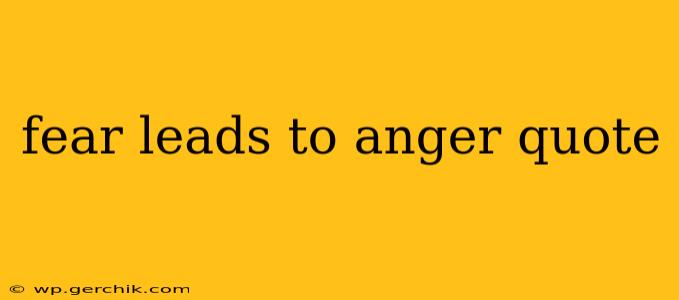The quote "Fear leads to anger" resonates deeply, appearing in various contexts, most famously in Star Wars: Episode III – Revenge of the Sith. While fictional, it taps into a fundamental aspect of human psychology, highlighting a common emotional progression. This post delves into the psychological mechanisms behind this powerful statement, exploring its nuances and providing real-world examples. We'll also address some frequently asked questions surrounding this concept.
What is the Psychology Behind "Fear Leads to Anger"?
The connection between fear and anger isn't merely a dramatic trope; it's rooted in how our brains process and respond to threats. When we perceive danger – a physical threat, a social rejection, or an uncertain future – our amygdala, the brain's fear center, activates. This triggers the release of stress hormones like cortisol and adrenaline, preparing us for a "fight-or-flight" response.
However, if the fear is prolonged, unresolved, or perceived as unavoidable, the initial fear can morph into anger. This shift occurs because anger, in some ways, provides a sense of agency and control. Feeling angry allows us to channel the helplessness of fear into a more assertive, action-oriented emotion. Instead of feeling paralyzed by fear, anger empowers us to confront the source of our anxiety, even if that confrontation is ultimately unproductive.
Why Does Fear Sometimes Lead to Aggression?
The transition from fear to anger can manifest as aggression, particularly if the perceived threat feels inescapable or personally unjust. Aggression is a behavioral response aimed at removing or mitigating the threat. It's important to note that aggression is not always physical; it can also be verbal, passive-aggressive, or even self-directed (as in self-harm). The type of aggressive response depends on individual personality, past experiences, and the specific context of the fearful situation.
Can Fear Lead to Other Emotions Besides Anger?
While anger is a frequent outcome of unresolved fear, it's not the only possible emotional response. Fear can also lead to:
- Anxiety: Prolonged or chronic fear can manifest as generalized anxiety, characterized by persistent worry, nervousness, and difficulty concentrating.
- Depression: Feeling powerless and trapped in a fearful situation can contribute to feelings of hopelessness, sadness, and low self-esteem, eventually leading to depression.
- Sadness: Fear can directly trigger feelings of sadness, particularly if the fear is associated with loss, grief, or disappointment.
- Shame: Fear of judgment or failure can result in feelings of shame and self-criticism.
How Can We Manage the Transition from Fear to Anger?
Understanding the link between fear and anger is crucial for developing effective coping mechanisms. Strategies for managing this emotional transition include:
- Mindfulness and Meditation: These practices help us to become more aware of our emotions as they arise, allowing us to observe the fear and anger without judgment, reducing their intensity.
- Cognitive Behavioral Therapy (CBT): CBT techniques help to identify and challenge negative thought patterns associated with fear, replacing them with more rational and constructive perspectives.
- Stress Management Techniques: Regular exercise, deep breathing exercises, and spending time in nature can help to reduce overall stress levels, lessening the likelihood of fear escalating into anger.
- Communication Skills: Learning to express our feelings effectively and assertively can help prevent fear from building into explosive anger.
Does Fear Always Precede Anger?
While the quote suggests a direct causal link, it's not always a linear progression. Fear and anger can coexist, or anger might arise independently of fear, often stemming from frustration, injustice, or a sense of being wronged. The relationship between the two is complex and influenced by individual differences and contextual factors.
How Can I Help Someone Who Is Experiencing Fear That's Turning to Anger?
If you're concerned about someone whose fear is escalating into anger, provide a safe and supportive environment where they feel comfortable expressing their feelings. Encourage open communication, active listening, and seek professional help if needed. Remember that intervening early can prevent the situation from escalating further. Referring them to a therapist or counselor who can provide professional guidance is a vital step.
In conclusion, while "fear leads to anger" is a simplification, it reflects a significant psychological truth. Understanding this connection allows us to better manage our emotions and navigate challenging situations with more awareness and self-compassion. Recognizing the potential transition from fear to anger is essential for both personal well-being and fostering healthier relationships.
